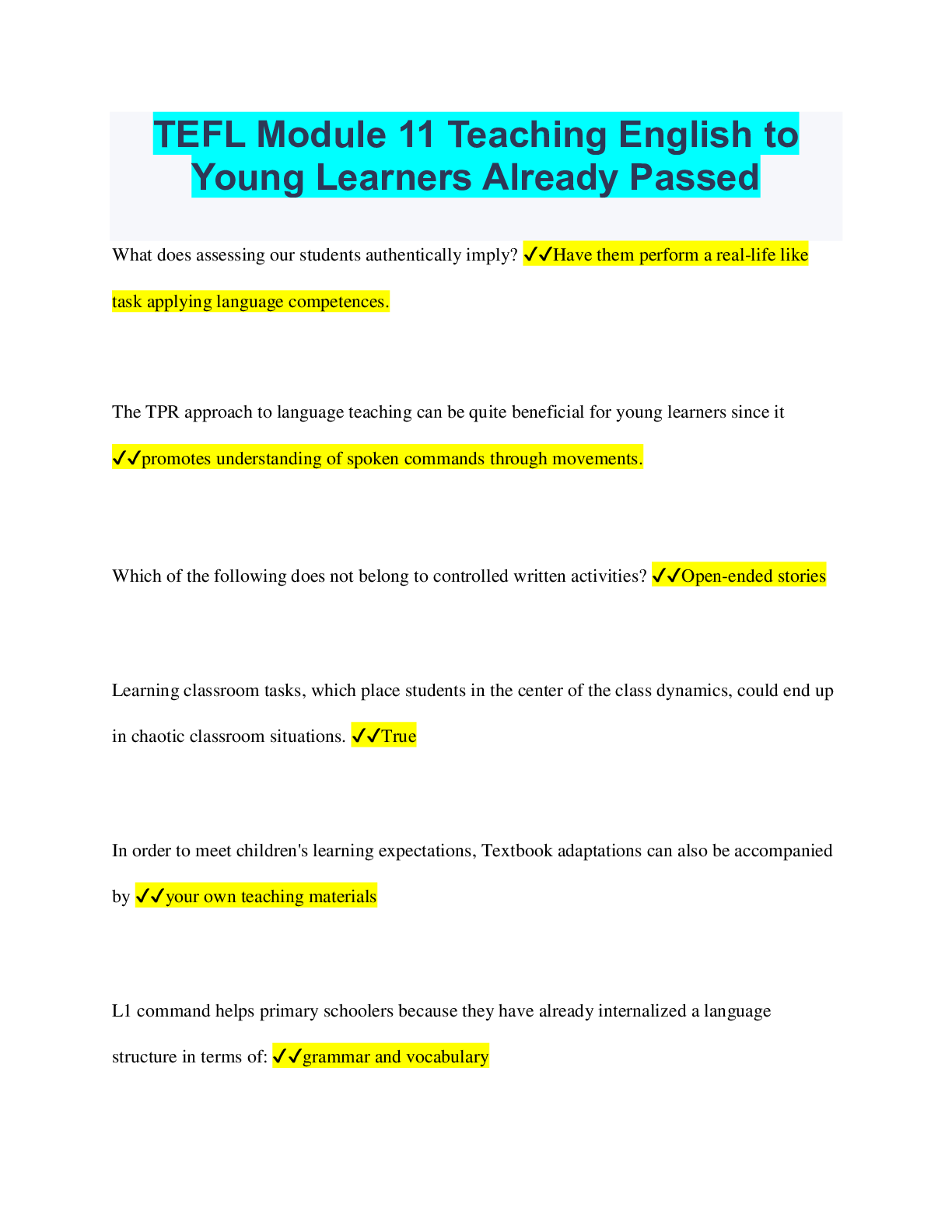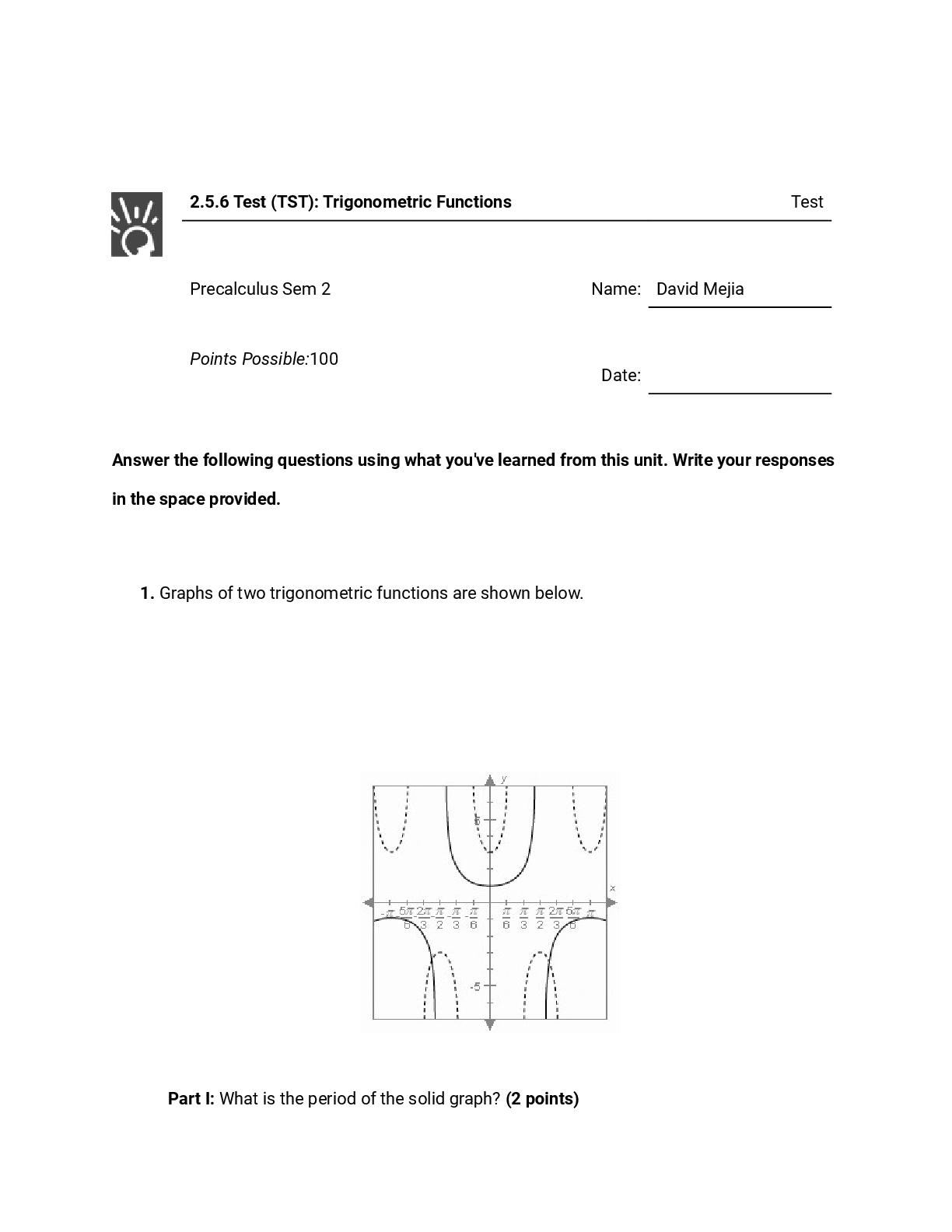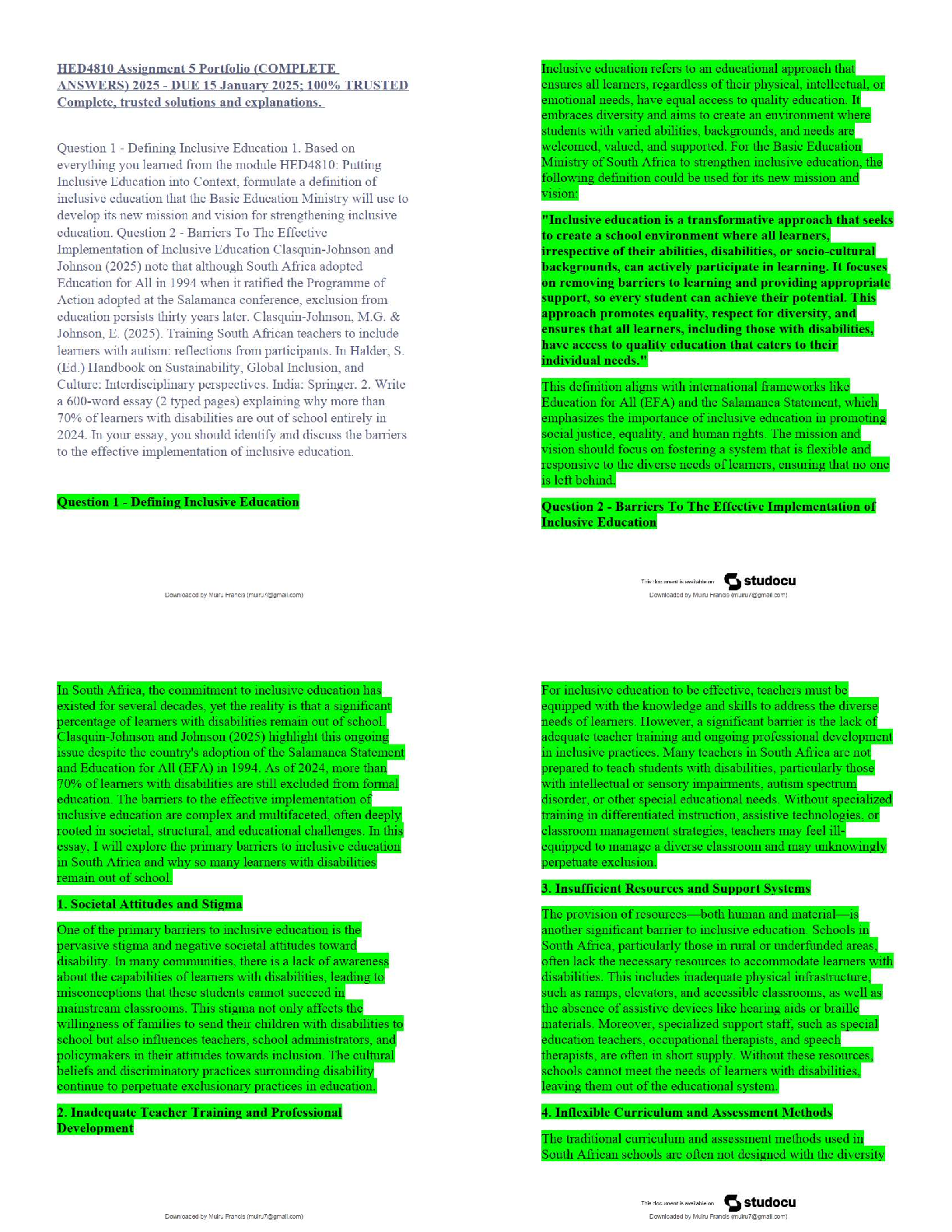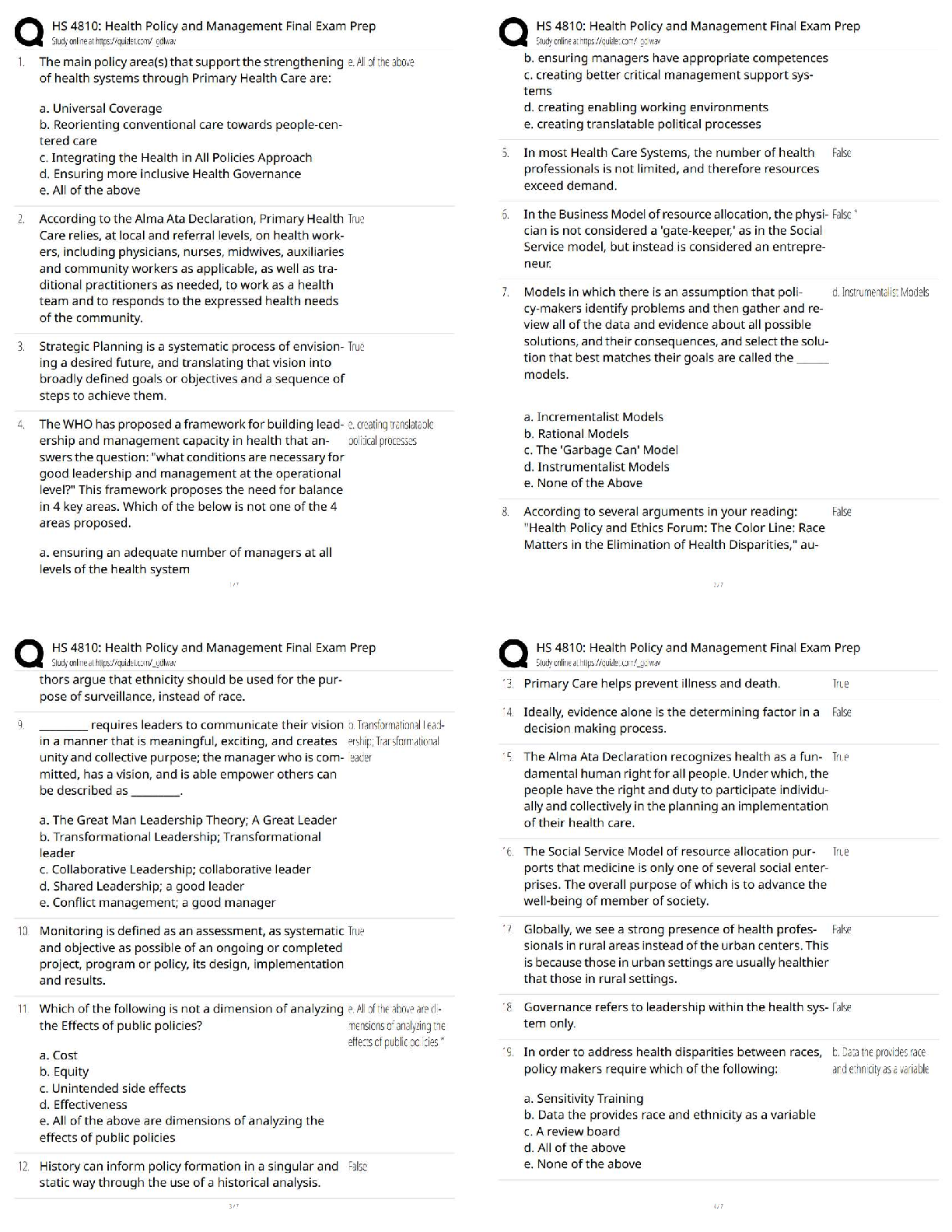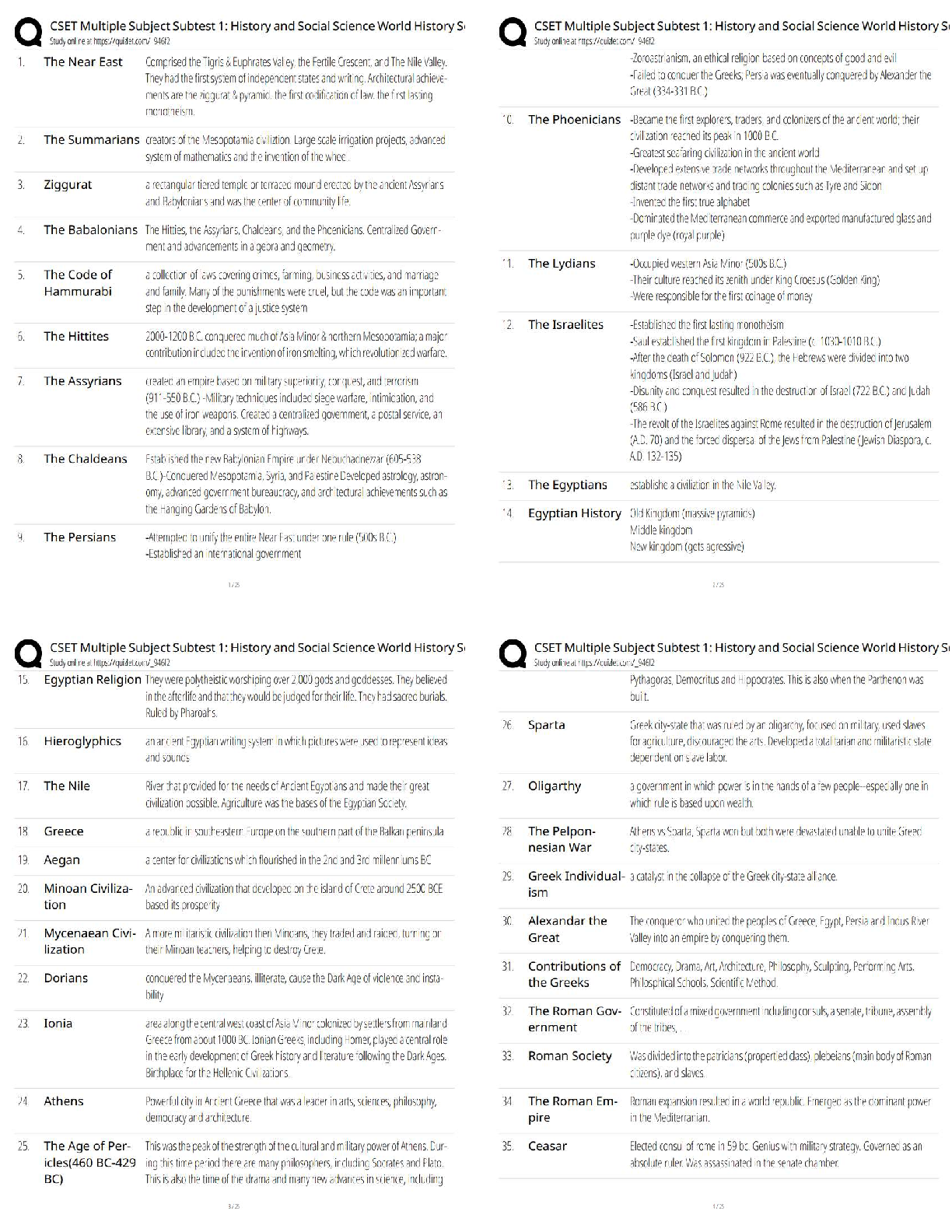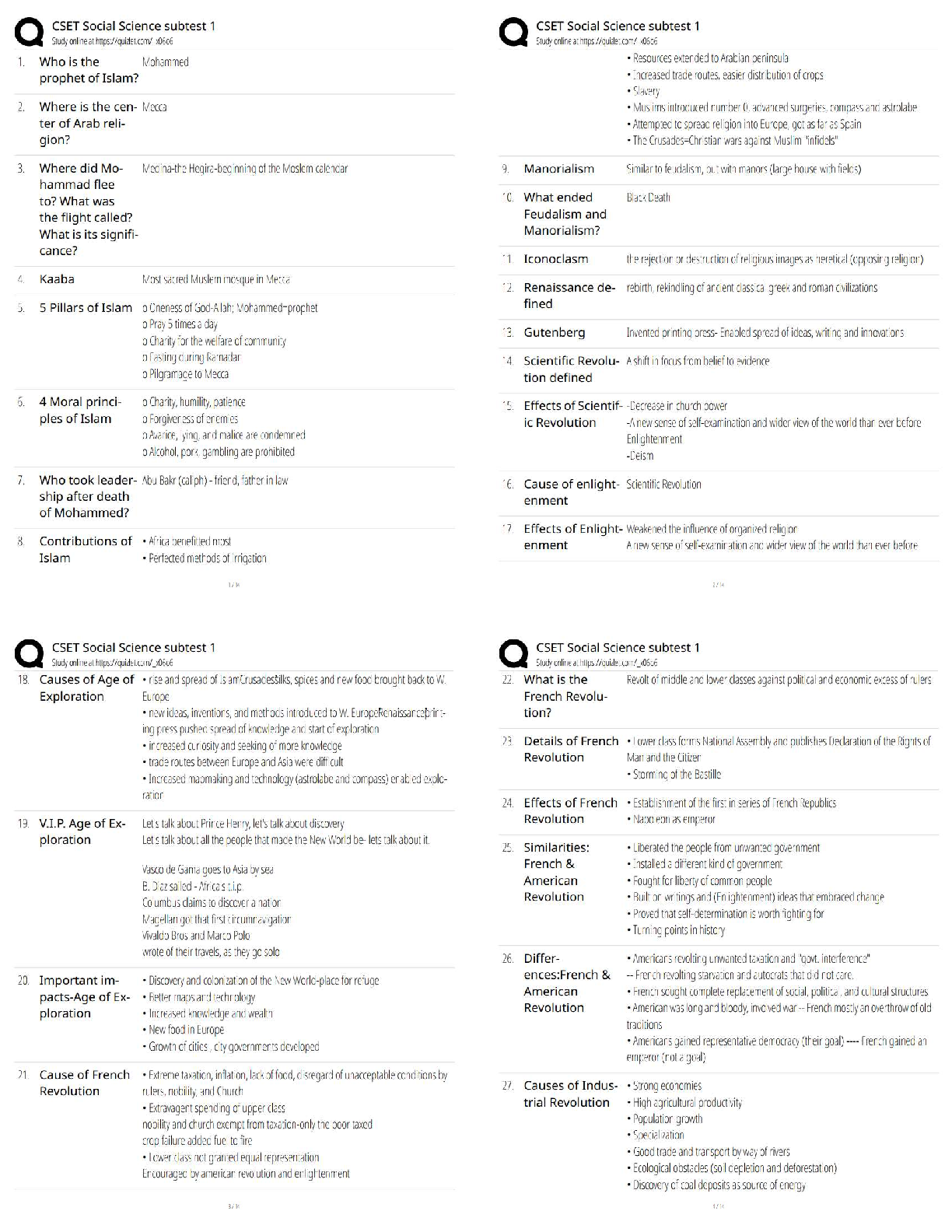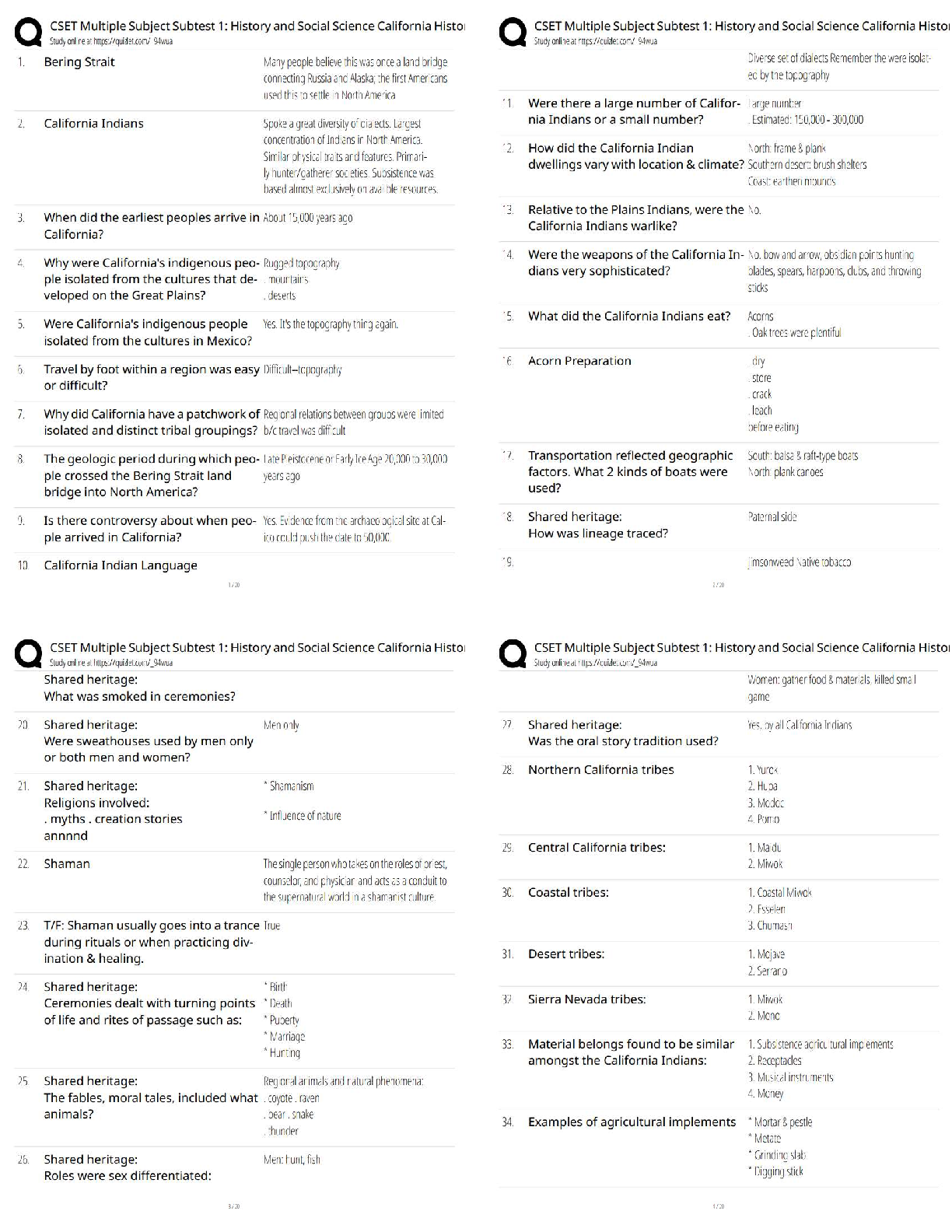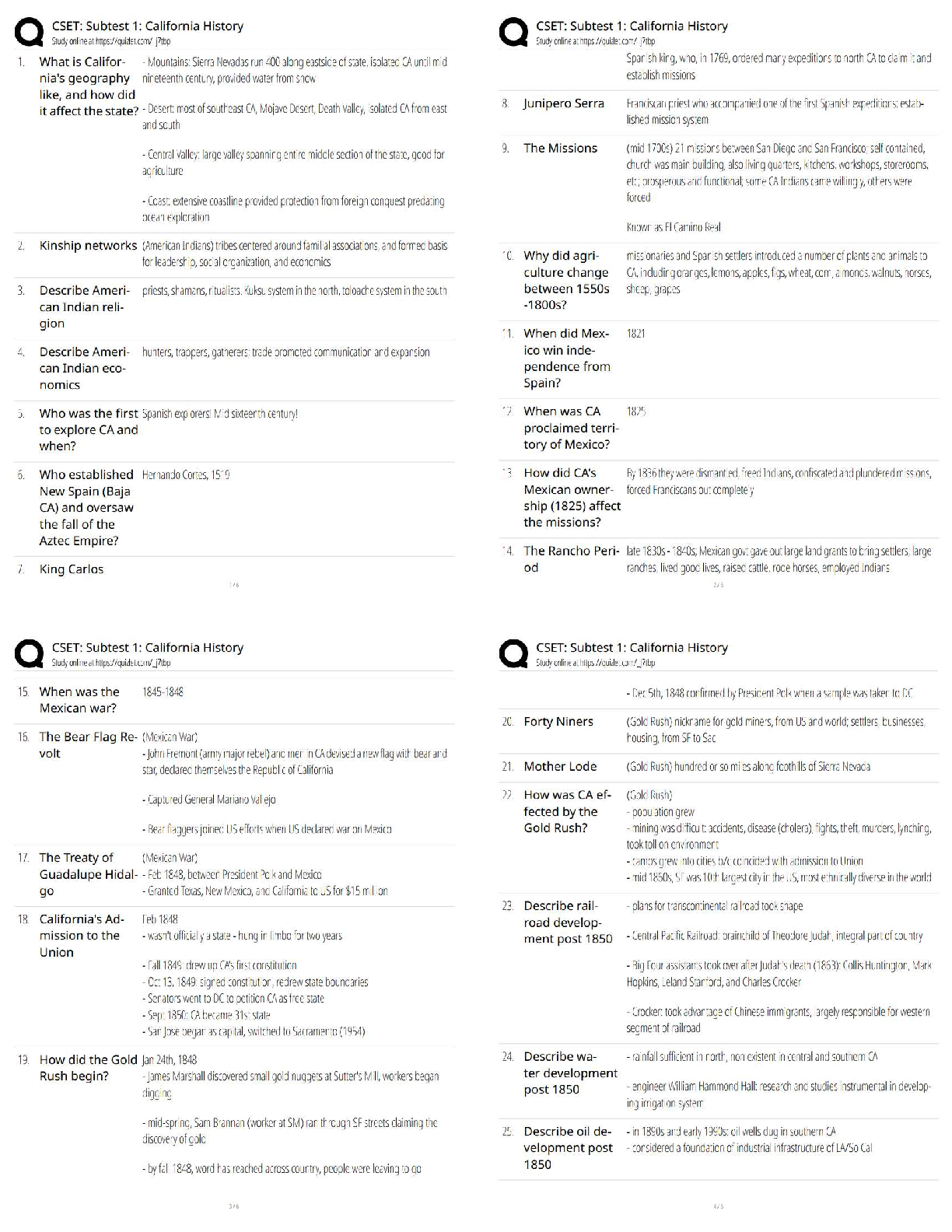Social Sciences > QUESTIONS & ANSWERS > PPR Exam Questions and Answers Already Graded A (All)
PPR Exam Questions and Answers Already Graded A
Document Content and Description Below
PPR Exam Questions and Answers Already Graded A IEP ✔✔A written Statement for each child with a disability that identifies measurable, annual goals that allow the child to make progress in the ... general education curriculum Team teaching ✔✔the teachers are teaching jointly in the classroom Horizontal teaching ✔✔working across disciplines at the same instructional level to achieve jointly valued teaching goals Vertical teaching ✔✔teachers from different levels working to achieve a common goal Mentoring ✔✔provides professional insights, the sharing of experiences, and generally eases a new teacher's entry into the profession the contract approach ✔✔Students sign a statement indicating they understand the rules and consequences low teacher control ✔✔students are given a great deal of autonomy for the behavioral decisions they make in the classroom medium teacher control ✔✔the control of student behavior is a joint responsibility of the student and the teacher high teacher control ✔✔the teacher actively reinforces appropriate behavior and penalizes undesired behaviors Bloom's Taxonomy ✔✔Remember Understand Apply Analyze Evaluate Create Remembering ✔✔Retrieve objective knowledge comprehension ✔✔demonstrating understanding of facts and ideas by organizing, comparing, translating, interpreting, giving descriptions, and stating the main ideas Applying ✔✔use knowledge to carry out a learning task Analysis ✔✔examining and breaking information into component parts, determining how the parts relate to one another, identifying motives or causes, and making inferences and find evidence to support generalizations (examine somthing to determine how component parts work together) Evaluation ✔✔Offer judgment based on sound knowledge Create ✔✔generate a product that integrates knowledge Portfolio ✔✔student selected collection of learning products; provides a comprehensive view of learner achievement Summative assessment ✔✔assessment that offers a final score at the conclusion of a learning cycle Formative assessment ✔✔to monitor student learning to provide ongoing feedback that can be used by instructors to improve their teaching and by students to improve their learning teachers identify students' strengths and weaknesses in order to guide them toward greater understanding of the topic The Fishbowl Strategy ✔✔Students ask questions, present opinions, and share information when they sit in the "fishbowl" circle, while students on the outside of the circle listen carefully to the ideas presented and pay attention to process ability-based grouping ✔✔students with similar achievement levels or academic strengths are placed in the same group heterogeneous grouping ✔✔students with varied learning levels working together and helping each other to reach an instructional goal homogeneous grouping ✔✔the students are all at the same instructional level Constructivism ✔✔people construct their own understanding and knowledge of the world, through experiencing things and reflecting on those experiences Cooperative learning ✔✔is the instructional use of small groups so that students work together to maximize their own and each other's learning; students assume responsibility for the learning process and work together under reduced teacher directiveness Behaviorism ✔✔the theory that human and animal behavior can be explained in terms of conditioning, without appeal to thoughts or feelings, and that psychological disorders are best treated by altering behavior patterns wiki ✔✔provides opportunities for students to generate, change, and collaborate in creating an electronic document Erikson's stages of psychosocial development ✔✔trust vs. mistrust autonomy vs. shame and doubt initiative vs. guilt industry vs. inferiority identity vs. role confusion trust vs. mistrust ✔✔-0-2 years old -Can I Trust the World? -based on what their caregiver provides to meet their needs children develop trust or mistrust autonomy vs. shame and doubt ✔✔-The child begins to recognize boundaries that must be observed in order to maintaing cooperation with others. -Autonomy=self-insistence -Shame & Doubt= the need to excercise control -Early childhood to 2-4 initiative vs. guilt ✔✔-Child recognizes that what he or she is now able to do creates a sense of guilt brought on by developing conscience when he or she considers the possibilities and consequences of acting on new potential. -Preschool to 4-5 industry vs. inferiority ✔✔-Industry= the desire to produce, make things, & to imitate adult productivity -Inferiority= caused by the child's lack of readiness for the tasks -5-12 years identity vs. role confusion ✔✔-The individual recognizes the pending need to assume an adult role but feels confusion and resistance over possibly having to settle on a role that may not reflect his or her will -13-19 Intimacy vs. isolation ✔✔-Intimacy=individual shares his or her identity with others -Isolation= interpersonal relationships do not adequately address the individual's need for intimacy -late adolecents to adulthood Semantic map ✔✔maps or webs of words. The purpose of creating a map is to visually display the meaning-based connections between a word or phrase and a set of related words or concepts Teacher as facilitator ✔✔a teacher who does not operate under the traditional concept of teaching, but rather is meant to guide and assist students in learning for themselves Teacher as supervisor ✔✔a nonparticipatory, directional function Teacher as facilitator ✔✔The teacher facilitates students' progress through an activity Classroom rules should: ✔✔be consistent with district and campus rules Piaget's stages of cognitive development ✔✔Sensorimotor Preoperational Concrete Operational Formal Operational Sensorimotor ✔✔-Experience processed by reaching, grasping & moving about -Experience centered on child's body -Object permanence - 0 to 2 Pre operational ✔✔-Symbolic functions -Intentional use of language -Child can represent objects and events removed in time and space -Egocentrism -Preschool years Concrete Operational ✔✔-Decentering from egocentrism -Conservation -Ordering ability -Integration of self into physical and social environments -Elementary years Formal Operational ✔✔-Abstract thought -Ability to plan -Ability to think deductively -Early adolescence on [Show More]
Last updated: 2 years ago
Preview 1 out of 9 pages
.png)
Buy this document to get the full access instantly
Instant Download Access after purchase
Buy NowInstant download
We Accept:

Also available in bundle (1)
Click Below to Access Bundle(s)
.png)
PPR BUNDLED EXAMS QUESTIONS AND ANSWERS [2022/2023] [VERIFIED ANSWERS]
PPR BUNDLED EXAMS QUESTIONS AND ANSWERS [2022/2023] [VERIFIED ANSWERS]
By Nutmegs 2 years ago
$22
16
Reviews( 0 )
$10.00
Can't find what you want? Try our AI powered Search
Document information
Connected school, study & course
About the document
Uploaded On
Feb 19, 2023
Number of pages
9
Written in
All
Additional information
This document has been written for:
Uploaded
Feb 19, 2023
Downloads
0
Views
131


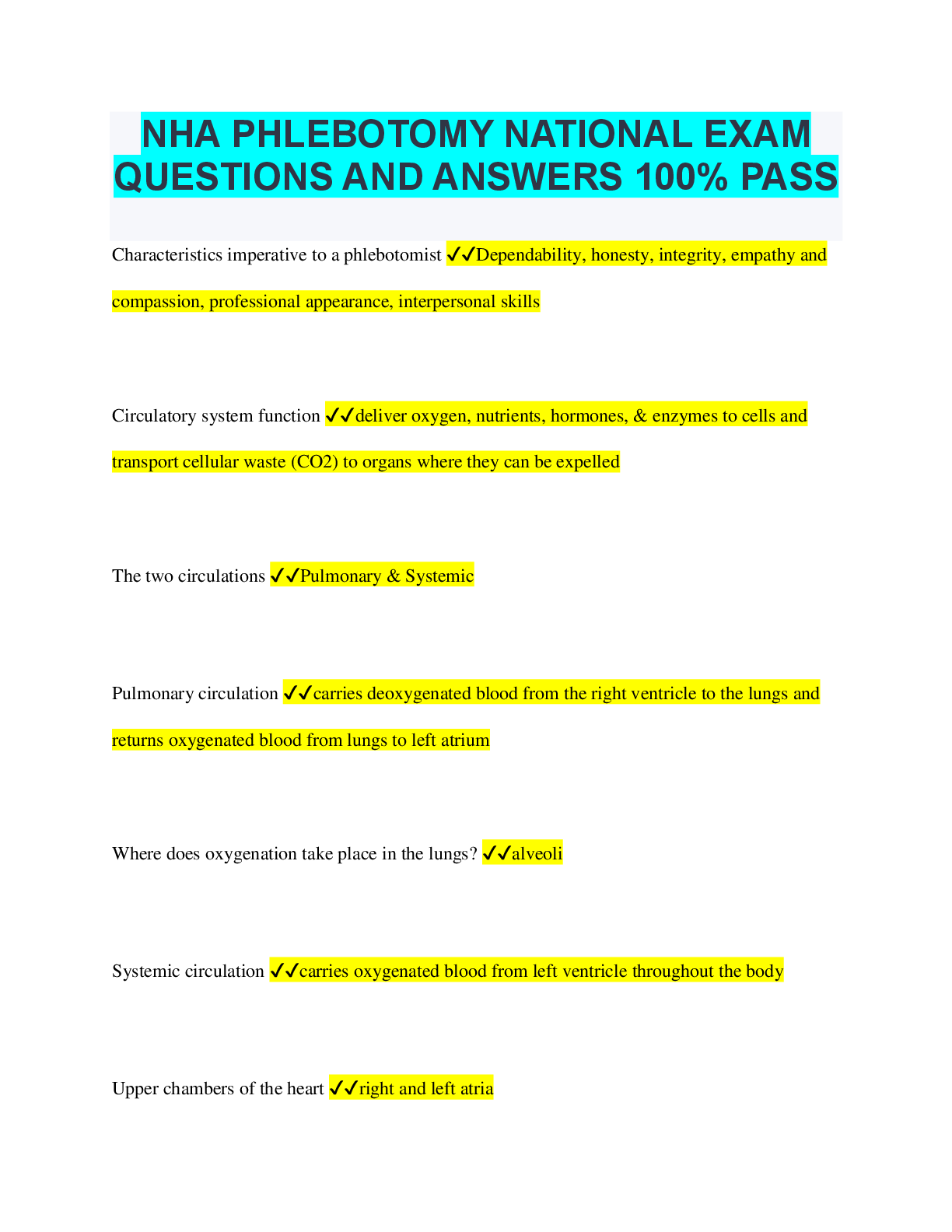




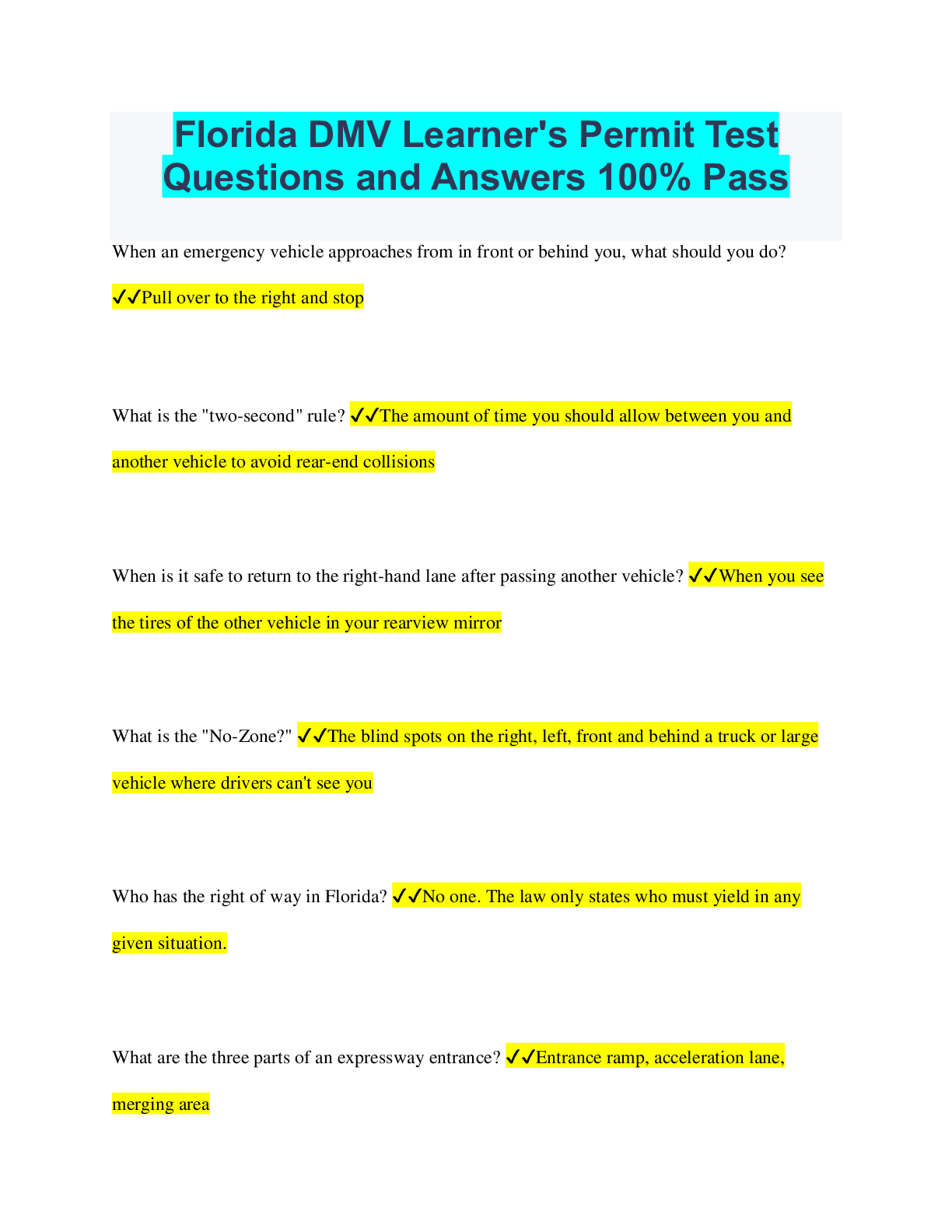
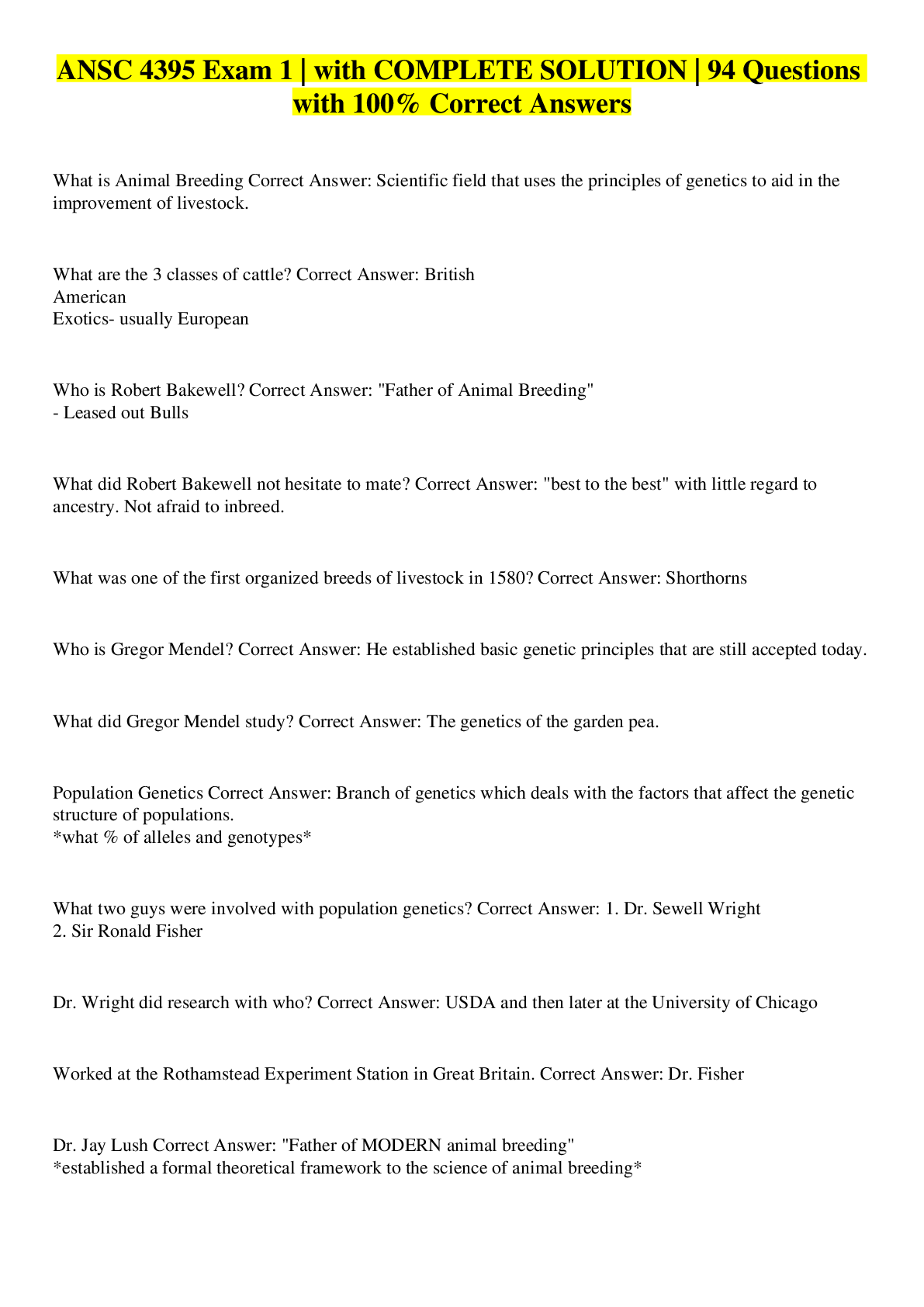

.png)

